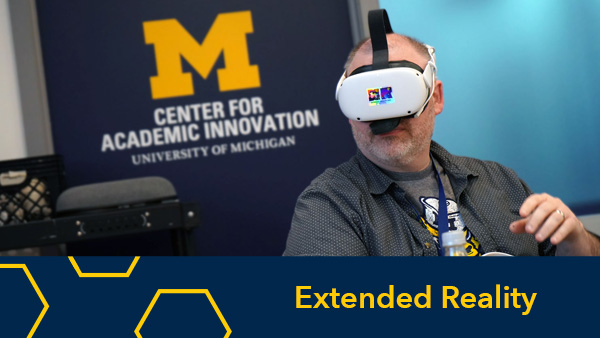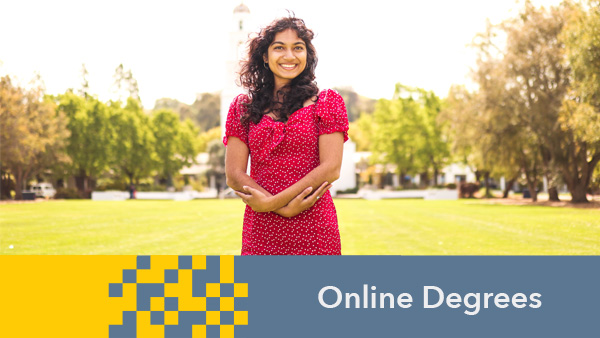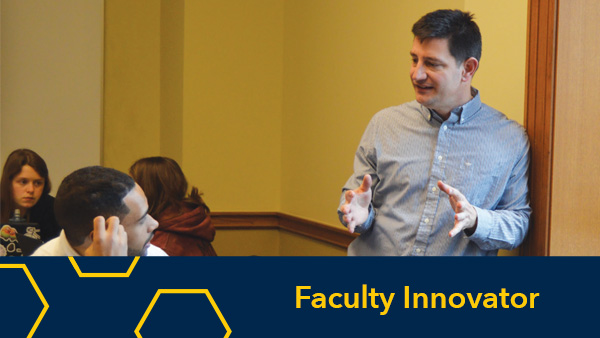James Park, Project Manager, Digital Learning Initiatives
Michael Skib, Instructional Media Specialist
James Park and Michael Skib were part of Academic Innovation’s contingent that attended the 2017 Coursera Partners Conference, March 29-31, hosted by the University of Colorado on the CU Boulder Campus. Below, they offer some reflections on their experiences at the conference.
 Reactions from James Park, Project Manager, Digital Learning Initiatives:
Reactions from James Park, Project Manager, Digital Learning Initiatives:
In collaboration with Stephanie Haley, Rebecca Quintana, and Steve Welsh, I created a poster, titled “How do MOOCs fit within the broader landscape of academic innovations at the University of Michigan?,” which I delivered at the poster session. It illustrates how MOOCs not only illuminate the work of the Digital Education and Innovation Lab (being the primary lab behind the creation of U-M’s MOOCs) but also emphasize the greater interconnectedness of Academic Innovation’s three labs and offer a window into the much broader, more diverse activities undertaken by Academic Innovation as a whole. That opportunity to share ideas and receive feedback, to ask and answer questions, and to learn from other attendees probably defined my conference experience. It also left me with some distinct impressions:
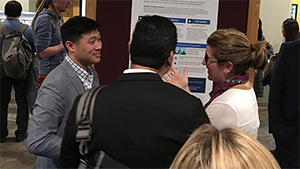 We at Academic Innovation are deeply engaged in the work of digital teaching and learning not only at its core but, importantly, also at its (ever permeable) boundaries. Our collaboration with Coursera is emblematic of the MOOC work “of the present,” and we are also experimenting with ways that MOOC-type projects and non-MOOCs alike can be further harnessed inside and outside of university walls.
We at Academic Innovation are deeply engaged in the work of digital teaching and learning not only at its core but, importantly, also at its (ever permeable) boundaries. Our collaboration with Coursera is emblematic of the MOOC work “of the present,” and we are also experimenting with ways that MOOC-type projects and non-MOOCs alike can be further harnessed inside and outside of university walls.- We are part of a community whose practices we are learning from as well as influencing.
- We are extremely fortunate to have strong institutional support, generous resources, and our university leadership’s firm belief in our mission.
Though it was brief, the 2017 Coursera Partners Conference revealed some of the potential pathways forward for Coursera, U-M, and Academic Innovation, and it provided an opportunity for our team to reflect on what we’ve accomplished both on the Coursera platform and in the wider field of digital teaching and learning. And thankfully, a few of us even found a small window of time to enjoy Boulder’s beautiful mountains!
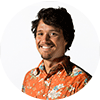 Reactions from Michael Skib, Instructional Media Specialist:
Reactions from Michael Skib, Instructional Media Specialist:
As much as anything, I will remember the gorgeous CU Boulder campus. Flanked by the Flatirons in the foothills of the Rockies, the campus was built in the so-called “Tuscan Vernacular Revival” style. Seemingly frozen in time, it radiates a disarming Mediterranean warmth that paired well with Boulder’s expansive, cloudless sky. Perhaps that had something to do with why everybody seemed so happy to be there.
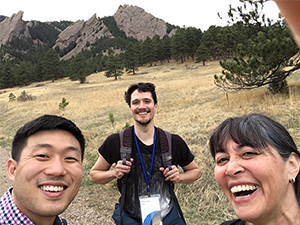 The atmosphere throughout the conference was warm and hospitable. Friends and colleagues reunited. Many of the people in this community already know each other — I felt somewhat like an outsider out at first, as my circle of professional acquaintances is more or less limited to the U-M community. Yet people seemed genuinely curious about my work and what I hoped to gain from attending this conference.
The atmosphere throughout the conference was warm and hospitable. Friends and colleagues reunited. Many of the people in this community already know each other — I felt somewhat like an outsider out at first, as my circle of professional acquaintances is more or less limited to the U-M community. Yet people seemed genuinely curious about my work and what I hoped to gain from attending this conference.
I was immediately taken aback by the size of this community. Stuck inside my U-M bubble, it is easy to forget how vast and multifaceted this community is; in attendance were people from more than 100 institutions, from 27 different countries. It seemed that Coursera’s entire staff was there as well, and many were eager to engage in conversation and hear about how we’ve been using their platform, and the things that we hope to see in the future. Despite the overwhelming number of attendees at the conference, I was struck by how much alignment I found between everyone I spoke to; we were all there out of a desire to make education work better, for all.
The first day of the conference featured a keynote presentation by Dr. Daphne Koller, co-founder and former president of Coursera. She took some time to celebrate a few significant milestones; Coursera now hosts more than 2000 courses, and more than 180 specializations. By their count, they’ve reached more than 25 million learners. They also host four fully online degree programs. Despite these successes, they are not content to stay the course, which isn’t entirely surprising. As influential and successful as Coursera has been, the online education space is becoming increasingly competitive. Throughout the conference, Coursera touted several major platform updates that will facilitate curriculum personalization and building career relevant skills. The general mismatch between the skills our workforce has and the skills the job market desires is a problem for many job seekers and for many growing industries. Though this is just one of several challenges higher education faces, it is one I believe Coursera can help to solve.
Later that day, after a blizzard of smaller, topical group sessions, I went to a presentation of posters created by about 20 different Coursera partners. Posters were hung in a densely packed atrium along with trays of vanishing hors d’oeuvres. This is when my initial feeling of being outsider began to disappear and give way to curiosity. It was fascinating to catch a glimpse of how other institutions view the digital education space, to converse with people from Stanford, Geneva, Alberta, Hong Kong, and elsewhere about things as broad as what it’s like to work with faculty, and as specific as the technical setup behind the Penn Modern Poetry MOOC’s live streaming office hours. I felt at ease and at home. I felt galvanized by the understanding of how immensely this field has grown in the three years I’ve worked for Academic Innovation. I felt gratitude toward Coursera for bringing us all together, to share and exchange knowledge; one institution operating in isolation cannot bring about the changes we hope to see in higher education.
